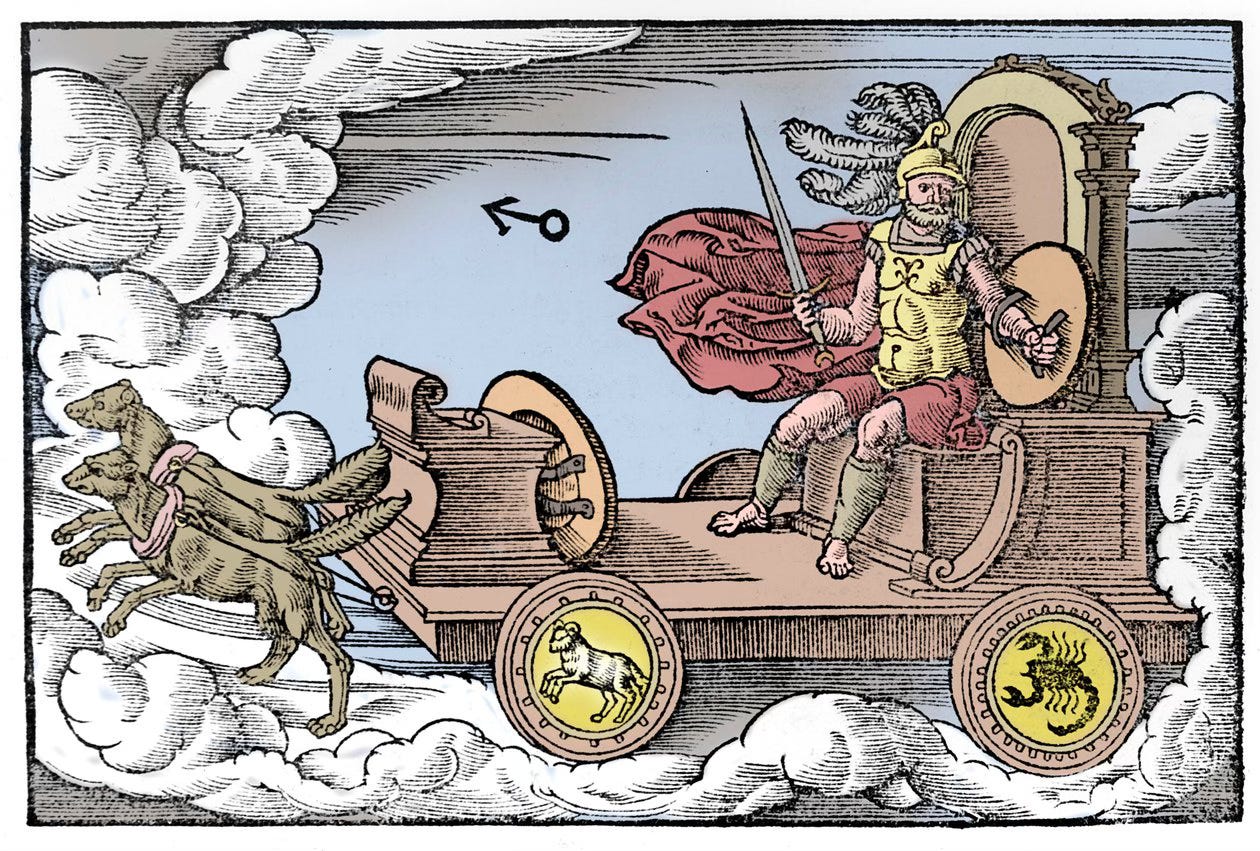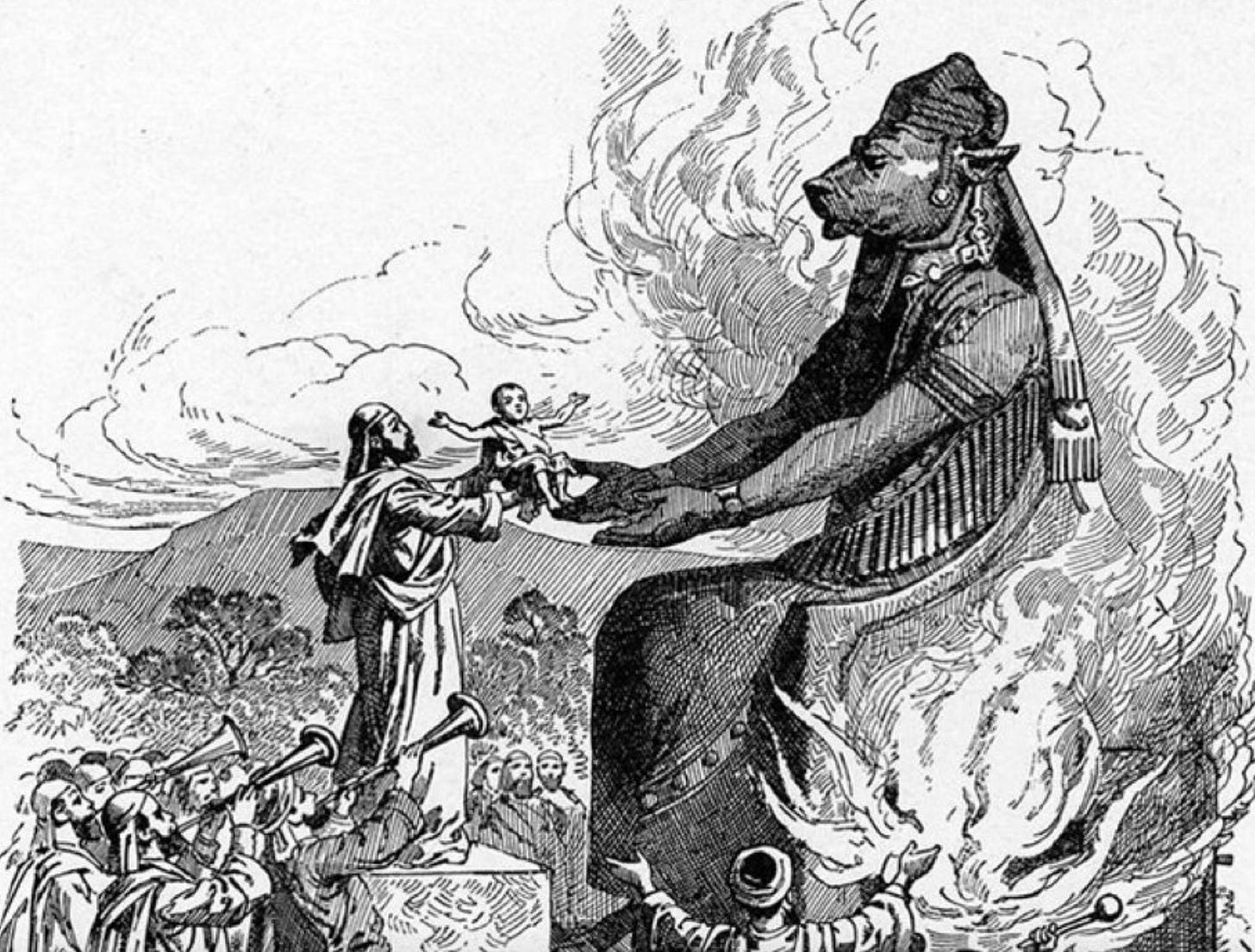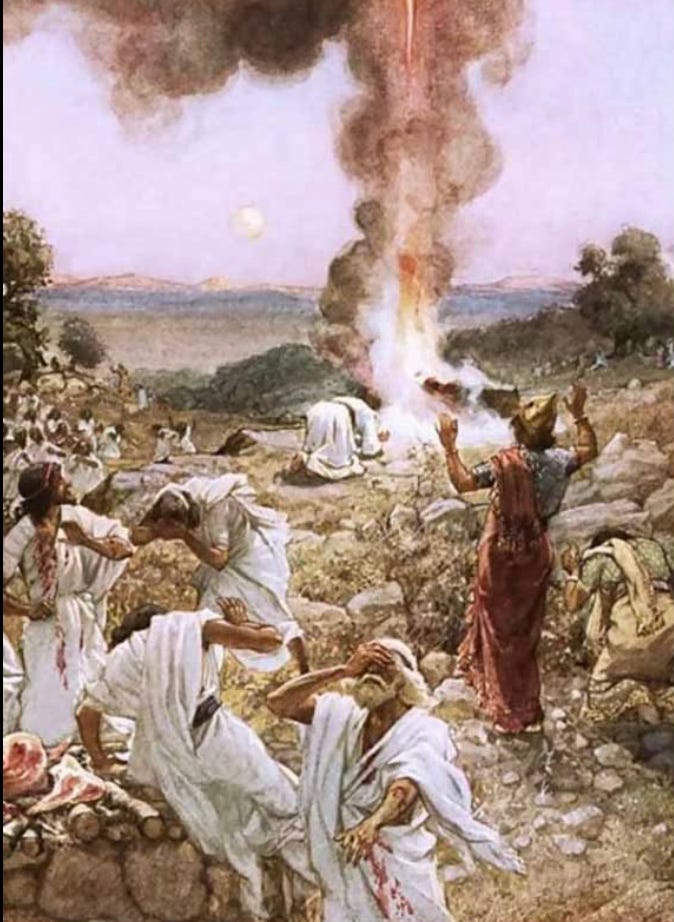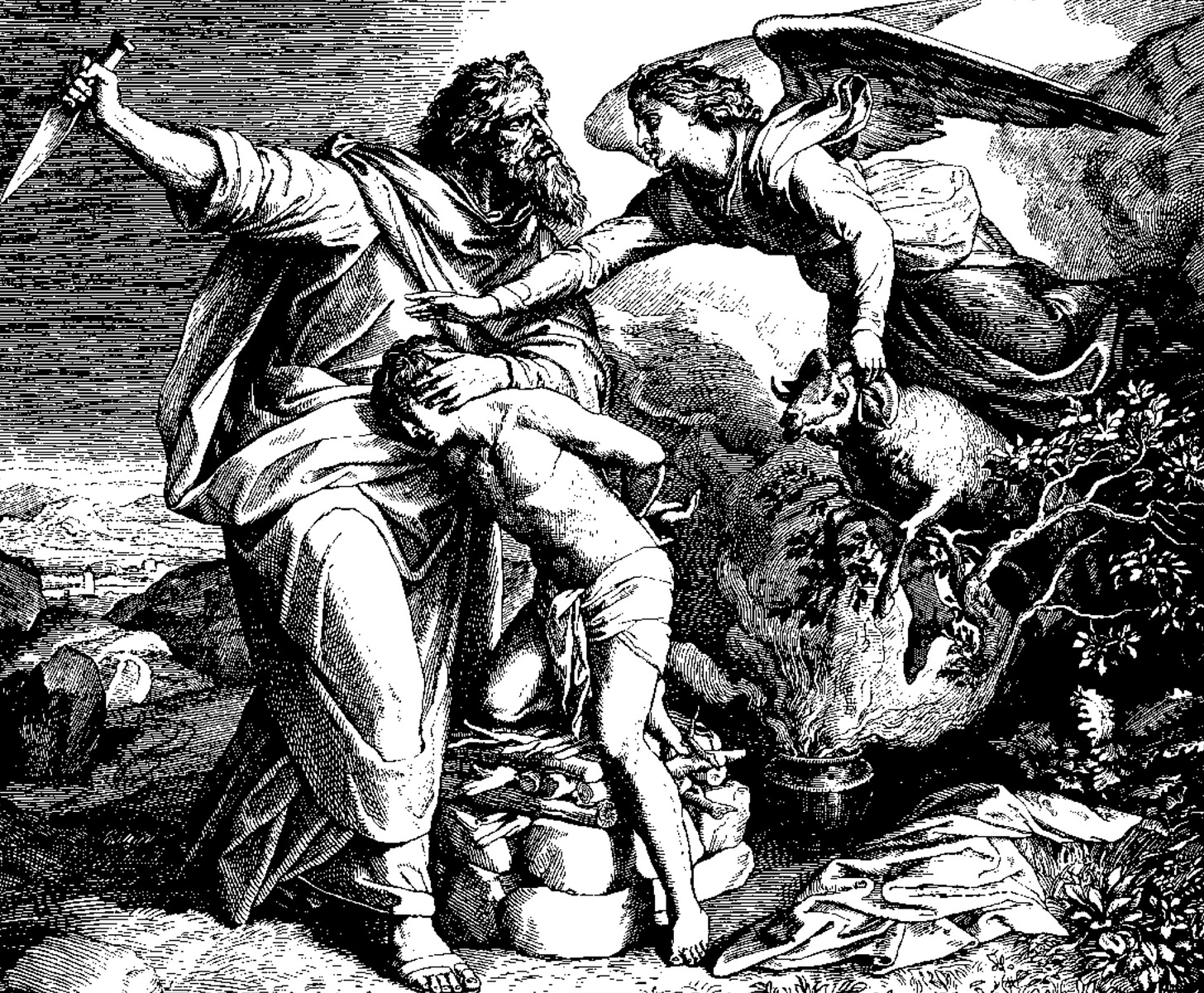Dear readers,
In my years of research, I’ve come across many arguments against God and Jesus, as I’m sure most of you have too.
You’ve probably heard claims that the God of the Bible is no different from pagan deities like Baal, who demanded child sacrifice, or that Jesus’ death was merely a human sacrifice orchestrated by a cruel God.
Those arguments lead me to think of all the ways God distinguished Himself from demonic entities, fallen angels, or downright inanimate objects humans worshipped as ‘gods’ in the Old Testament and how Jesus carried this through the New Testament, distinguishing Himself from the customs and traditions of the pagans, such as the Roman god Mars.
Others may question whether Jesus truly needed to be divine, suggesting He was just a man or a lesser being sent to die.
These ideas strike at the heart of who God is and what His plan of redemption means. It’s sad to see so much confusion and a lack of understanding of Scripture by skeptics, and even some who call themselves believers.
That inspired me to write this article highlighting a contrast with false gods who demand human sacrifice, and why Jesus must be God Himself, fully divine and fully human, or else the character of God is misunderstood, and the gospel unravels.
The Abomination of Child Sacrifice in Pagan Worship
To understand the uniqueness of the God of the Bible, we must first examine the pagan gods, particularly Baal, who was associated with child sacrifice.
Baal, a Canaanite deity, was worshipped across the ancient Near East as a god of fertility, storms, and prosperity. The worship of Baal often involved gruesome rituals, including the sacrifice of children, as a means to appease the false god and secure ‘blessings’ like rain for the crops. The Bible explicitly condemns these practices, revealing their evil and stark contrast with the character of Yahweh or God.
In Leviticus 18:21, God commands, “You shall not give any of your children to offer them to Molech, and so profane the name of your God: I am the Lord.”
Molech, another Canaanite deity often identified with Baal, was infamous for child sacrifice, where infants were burned alive in fire.
This practice was so detestable that God warned Israel repeatedly against it: “Any one of the people of Israel or of the strangers who sojourn in Israel who gives any of his children to Molech shall surely be put to death.” (Leviticus 20:2).
The prophet Jeremiah further declares God’s disgust, saying, “They built the high places of Baal, which are in the valley of the son of Hinnom, to cause their sons and their daughters to pass through the fire unto Molech; which I commanded them not, neither came it into my mind, that they should do this abomination, to cause Judah to sin.” (Jeremiah 32:35).
These verses make it clear that child sacrifice was an abomination to God, something He never commanded nor even considered. Yet, some skeptics claim that God is Baal, equating the God of the Bible with these pagan deities.
This is a lie rooted in misunderstanding or deliberate misrepresentation.
The Bible consistently distinguishes God (Yahweh) from Baal.
In perhaps my favorite event from the Old Testament, 1 Kings 18 records how the prophet Elijah confronts the prophets of Baal on Mount Carmel, challenging them to call on their god to send fire from heaven.
Baal remains silent and powerless, while Yahweh answers with fire, proving His supremacy and reality. “The people declare, ‘The Lord, He is God; the Lord, He is God'” (1 Kings 18:39).
This dramatic showdown underscores that Yahweh is not Baal.
Jesus even asks in Matthew 12:26 “Can Satan cast out Satan?”
Why would the God of Elijah be fighting against Himself?
Because there is only one true God, distinct in power and character from all false gods.
The claim that God is Baal also ignores the historical and cultural context. Baal worship was polytheistic, tied to fertility and human effort to manipulate divine favor. God, by contrast, is the eternal, self-existent Creator who demands exclusive worship: “I am the Lord your God… You shall have no other gods before me” (Exodus 20:2-3).
To equate the two is to ignore the biblical narrative as well as the moral chasm between them.
Baal is Not Yahweh
The claim that Yahweh is Baal simply because "baal" means "lord" is a linguistic fallacy that ignores context and biblical distinction.
While "baal" is a common Semitic title meaning "lord" or "master," the Bible consistently differentiates Yahweh from Baal by associating Baal with specific pagan identities, such as Baal Hadad or Baal of Peor, which are linked to idolatry and fertility cults (e.g., Judges 2:11-13, 1 Kings 18).
Yahweh is never referred to as Baal in the Hebrew Scriptures, and when Israel conflated the two, it was condemned as apostasy (Hosea 2:16-17).
Therefore, equating Yahweh with Baal based on a shared title ignores both linguistic nuance and the Bible’s explicit theological opposition between the two.
The Voluntary Sacrifice of Christ
Skeptics who liken Jesus’ death to pagan human sacrifice often overlook the voluntary nature of Christ’s sacrifice, which fundamentally distinguishes it from the coercive rituals of Baal worship. In Canaanite religion, children were offered against their will, victims of a system that exploited human life to placate a deity’s whims.
By contrast, Jesus, as God incarnate, freely chose to lay down His life. John 10:18 records Jesus’ words: “No one takes it from me, but I lay it down of my own accord. I have authority to lay it down, and I have authority to take it up again.”
This voluntary act reflects God’s self-giving love, not a demand for blood to satisfy divine anger. Philippians 2:6-8 further emphasizes that Jesus, “though he was in the form of God,” humbled Himself to die on the cross.
Unlike Baal, who consumed the lives of others, God in Christ offers Himself, transforming the cross into an act of divine compassion rather than cruelty. This distinction invites skeptics to reconsider the cross not as a pagan parallel but as the ultimate revelation of God’s heart for humanity.
God’s Covenant Love vs. Baal’s Transactional Demands
The God of Abraham, Isaac, and Jacob stands in stark contrast to Baal not only in His rejection of child sacrifice but in the relational nature of His covenant with humanity. Baal worship was transactional, rooted in a polytheistic worldview where humans offered sacrifices (often their own children) to manipulate divine favor for material gain, such as fertile crops or victory in battle.
In contrast, God’s relationship with Israel, established through the covenant with Abraham and renewed at Sinai, is grounded in grace and fidelity.
Deuteronomy 7:7-8 reveals God’s motivation: “It was not because you were more in number than any other people that the Lord set his love on you and chose you… but it is because the Lord loves you and is keeping the oath that he swore to your fathers.”
This covenantal love, expressed through God’s initiative and faithfulness, requires obedience and trust, not bloodshed to appease the wrath of unpredictable gods.
Unlike Baal’s fickle demands, God’s commands, including the prohibiting of child sacrifice (Leviticus 18:21), reflect His moral character and desire for a people who reflect His holiness. This relational distinction underscores why equating God with Baal is a misunderstanding of scripture.
Some skeptics point out passages like Judges 11:29–31 that say before battling the Ammonites, Jephthah made a personal vow that if he returned victorious, he would offer as a burnt offering whoever came out of his house to meet him to God. However, there is no textual or theological support that God wanted it, approved it, or benefited from the sacrifice made by Jephthah.
This event is actually a tragic consequence of a rash vow, not God’s endorsement of human sacrifice.
Abraham's Test and God’s Character
The pagan gods demanded human blood to satisfy their whims, but God consistently forbids it. In Deuteronomy 12:31, God warns Israel about the Canaanites: “You shall not worship the Lord your God in that way, for every abominable thing that the Lord hates they have done for their gods, for they even burn their sons and their daughters in the fire to their gods.”
The sacrificial system in the Old Testament, with its animal offerings, was never about bloodshed for its own sake but about pointing to the ultimate sacrifice of Jesus Christ (Hebrews 10:4-10).
Skeptics and doubters try to equate God to an evil god who demanded human sacrifice. The story of Abraham and Isaac in Genesis 22 is actually a demonstration of God’s radical difference from the bloodthirsty pagan gods of the ancient world, and it serves to show the compassion of His character.
Abraham, raised in the Mesopotamian city of Ur, grew up in a culture steeped in idolatry, influenced by figures like his father Terah, who lived in an era familiar with Nimrod’s tyrannical rule and the pagan myths that mirrored stories like that of Cronus, the Greek god who devoured his children to secure power.
In that culture, child sacrifice, particularly of the firstborn, was a common ritual to appease power-hungry deities. Yet, when God asked Abraham to offer Isaac, His only son, it was not a demand for human sacrifice but a test of faith, designed to reveal both Abraham’s trust and God’s true nature, differing from the ‘gods’ of the time.
Abraham’s unwavering faith in God, whom he knew detested human sacrifice (as later affirmed in Leviticus 18:21 and Jeremiah 32:35), likely assured him that God would not require Isaac’s death. Abraham fully trusted God.
Then, God intervened, stopping Abraham and sending an angel who provides a ram as a substitute, declaring, “Do not lay your hand on the boy” (Genesis 22:12).
This act shows God’s rejection of the pagan practice of child sacrifice, contrasting sharply with gods like Baal, who consumed children, and Cronus, who symbolized selfish destruction.
Instead, God provides the sacrifice, sparing human life.
This event foreshadows the cross, where God, in the person of Jesus, the Lamb of God (John 1:29), offers Himself to atone for humanity’s sin.
Unlike the false gods who demanded bloodshed for their own gain, God’s self-sacrificial love proves His holiness and sets the stage for the ultimate redemption through Jesus Christ, who is both fully God and fully human.
The Problem of a Non-Divine Jesus
That brings me to the heart of the matter: Why must Jesus be God Himself?
The death of Jesus on the cross is central to our faith, but its meaning hinges on who Jesus is.
If Jesus is not fully God and fully human, the cross becomes a problem; either God is guilty of child sacrifice, or the atonement is insufficient to reconcile humanity to Him.
It’s not just those who reject Jesus altogether, but some who even call themselves Christian deny Jesus’ divinity, viewing Him as a mere man, a prophet, or a lesser divine being.
But if Jesus is not God, His death raises serious theological and moral issues. A few of the implications I can think of would be that if Jesus is only a man, then God sent an innocent human to die a brutal death to appease His own wrath.
This would make God no different from the pagan gods who demanded human sacrifice.
Another issue is if Jesus is a lesser divine being, like an angel or a created god (as some groups, like the Jehovah’s Witnesses, propose), then why would a just God demand the death of another being to atone for humanity’s sin? This still resembles the transactional bloodshed of pagan worship, where a deity requires a lesser being’s suffering to achieve a goal.
Moreover, a lesser being’s death could not bear the infinite weight of humanity’s sin. Only an infinite God could offer a sacrifice sufficient to atone for the sins of the world.
The character of God is at stake.
If Jesus is not God, the cross suggests that God is detached, unwilling to deal with sin Himself, and instead delegates the suffering to another.
This undermines the biblical truth that God is love (1 John 4:8).
Love sacrifices itself, not others.
Jesus as Fully God and Fully Human
The biblically faithful view is that Jesus Christ is both fully God and fully human.
The necessity of Jesus’ divinity is showcased in the Old Testament’s insistence that God alone is the savior of His people. Isaiah 43:11 declares, “I, even I, am the Lord; and beside me there is no saviour.”
If Jesus is not fully God, His role as the atoning sacrifice for humanity’s sin contradicts this foundational truth, reducing Him to a mere agent or intermediary, akin to the lesser deities of pagan myths.
However, the New Testament affirms Jesus Christ as the divine savior who fulfills God’s promise.
Hebrews 1:3 describes Jesus as “the radiance of the glory of God and the exact imprint of his nature,” who “made purification for sins.”
His divinity ensures that the cross is not the act of a subordinate being but God Himself redeeming humanity, consistent with the Old Testament’s portrayal of God as the sole deliverer.
To deny Jesus’ divinity is to sever the continuity between the God who rescued Israel from Egypt and the God who reconciles the world through Christ, undermining the gospel’s coherence and God’s unchanging nature.
The Bible affirms Jesus’ divinity in numerous passages. John 1:1 declares, “In the beginning was the Word, and the Word was with God, and the Word was God.”
This Word, identified as Jesus Christ in John 1:14, “became flesh and dwelt among us.” Colossians 2:9 states, “For in Him the whole fullness of deity dwells bodily.” Jesus Himself claimed divinity, saying, “I and the Father are one” (John 10:30) and “Before Abraham was, I am” (John 8:58), specifically using the name Yahweh.
These verses establish that Jesus is not a mere man or a subordinate being, but God incarnate.
At the same time, Jesus is fully human, born of a woman (Galatians 4:4), experiencing hunger, thirst, and suffering (Matthew 4:2; John 19:28). His humanity allowed Him to represent us, standing in our place as the “last Adam” (1 Corinthians 15:45).
His divinity ensured that His sacrifice was sufficient to atone for the sins of all humanity.
How Self-Sacrifice Sets Him Apart
The cross, then, is not an act of human sacrifice but God’s self-sacrifice. His love towards us.
Unlike Baal or Molech, who demanded the blood of others and are self-serving, God Himself took on human flesh to bear the penalty of sin.
This is the ultimate expression of love: “Greater love has no one than this, that someone lay down his life for his friends” (John 15:13).
God did not send a mere human or a lesser being to die. He came for us Himself. As 2 Corinthians 5:19 declares, “In Christ God was reconciling the world to Himself.”
This self-sacrificial love sets God apart from pagan gods.
Baal’s worshippers offered their own children to gain favor; God gave Himself to grant us forgiveness and eternal life. The cross is not about appeasing an angry deity but about God bridging the gap between His holiness and our sinfulness.
Romans 5:8 proclaims, “God shows His love for us in that while we were still sinners, Christ died for us.”
Implications of Denying Jesus’ Divinity
Denying Jesus’ divinity creates a cascade of theological problems.
First, it undermines the sufficiency of the atonement. If Jesus is not God, His death lacks the infinite value needed to pay for the sins of humanity.
A finite being’s sacrifice could not cover the eternal debt of sin.
Second, it distorts God’s justice.
If God punishes an innocent man or lesser being for humanity’s sin, He is unjust, violating His own standard of righteousness (Deuteronomy 32:4).
Third, it diminishes God’s love.
A God who sacrifices another rather than Himself is not the God who “so loved the world, that He gave His only Son” (John 3:16).
Moreover, denying Jesus’ divinity aligns with the spirit of paganism, where gods are capricious and detached. The God of the Bible is personal, relational, and sacrificial. He enters our suffering, takes our place, and rises victorious to offer us new life.
This is the gospel that sets Christianity apart from every other worldview!
I love to contrast the truth of the Bible with other belief systems or philosophies. Let me know if you’d like more of that in the comments below.
Conclusion: The God Who Loves
The claim that God is Baal or that Jesus’ death was a human sacrifice stems from a gross misunderstanding of God’s nature.
The God of the Bible is not a tyrant demanding blood, but a loving Father who gave Himself to save us.
Jesus must be God (fully divine and fully human) for the cross to be understood correctly as an act of unconditional and unfathomable love rather than mere cruelty.
His divinity ensures the atonement’s sufficiency, upholds God’s justice, and reveals His heart.
I hope this article encouraged you to see the beauty of a God who, unlike the false gods of old, sacrifices Himself to reconcile us to Him.
“In this is love, not that we have loved God but that He loved us and sent His Son to be the propitiation for our sins” (1 John 4:10).
So, as Jesus asked Peter three times in John 21:15, if Jesus were to ask you, “do you love me?”
What would you say?
Thank you for reading,
Alexandra
• MY LINKS •
Website: https://www.probablyalexandra.com
Youtube: https://www.youtube.com/channel/UCrbpH5eUxuaiyaDNVIEvYzw
Instagram: https://www.instagram.com/probablyalexandra/
Paypal: https://www.paypal.com/donate/?hosted_button_id=RTAVAGUUA6ALC









This article hit me hard, for I worked closely with some evil people for years, I looked up to them, I trusted them, I believed what they said, and I had no idea they were evil until the one day I pushed back on something they did to me… and then I readily saw their wickedness in full force (and it messed me up emotionally and spiritually).
How could this happen? It happened because the truly evil people today have absolutely no inhibitions in putting on whatever facade they want/need to get their way. They’ll be your friend, they’ll do “good” things, they’ll exude genuine looking kindness , they go out of their way for you (but only for little things). They have no problem saying whatever they think will soothe and appease you to get what they want, even as far as saying they are Christian and love Christ. That’s the problem with evil and Satan and his minions, we humans alone have no defense against their deceit and tricks. We are so easily distracted, manipulated, and defeated.
Luckily for me, Christ was at my side. I prayed, and He answered. The more I did that, the more I found strength, answers, and the ability to decipher and counter their wickedness. Our Creator works in mysterious ways, but He won’t let you down. I’m still in the same job, but now they know that I know who they are, and they now know who I am and whom I side with, and now they leave me alone; they don’t try to gaslight me anymore. Lines have been drawn, and I can now see clearly only by the grace of God. I’m different now, too. I see that the evil ones are scared of God, and I know why.
"His divinity ensures the atonement’s sufficiency, upholds God’s justice, and reveals His heart." So beautifully and perfectly put! Thank you, Alexandra. Hope you're out of the hospital and feeling better!